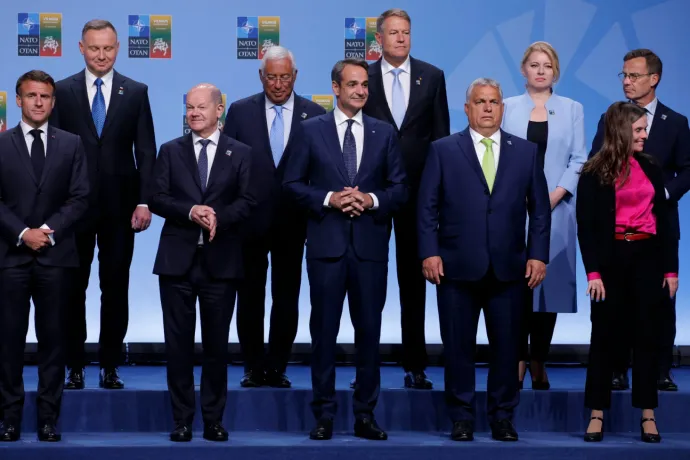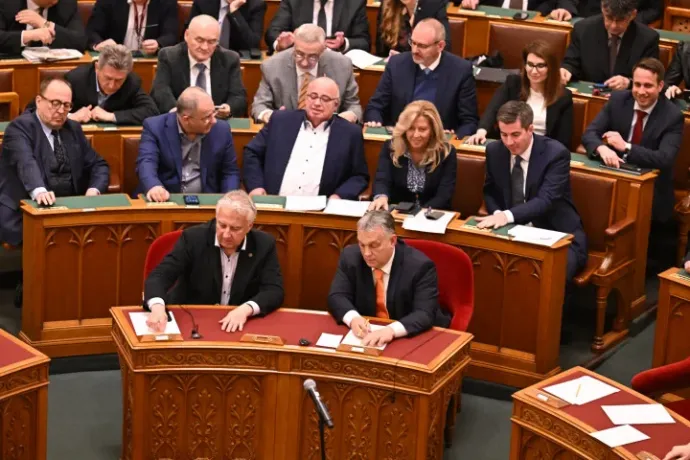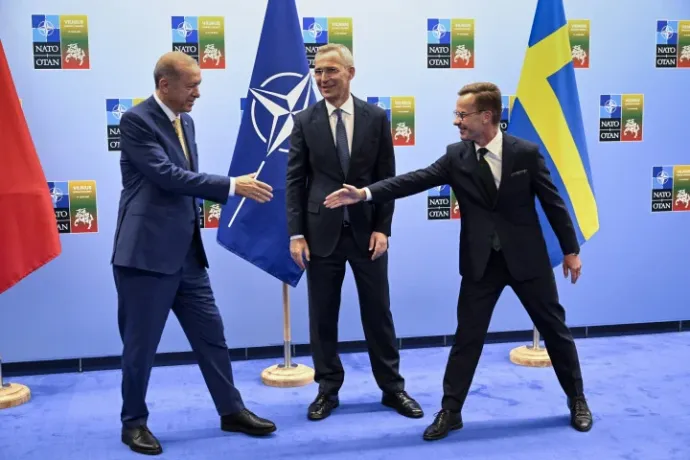Hungary's year-long delay of approving Sweden's NATO accession seems to have everything to do with Turkey after all

Parliament will vote on it during the autumn session, probably in October, during the spring session, let's not rush the Assembly, there is uncertainty on the matter within the Fidesz-KDNP faction, we have been insulted, we are waiting for reassurance – these are just some of the reasons given by the Hungarian government for why it has been delaying the approval of the Swedish NATO membership application for well over a year. Regardless of whether there truly were grievances, it was evident from the outset: Hungary is conferring with the Turks on the matter. And following the approval by Turkish President Recep Tayyip Erdoğan earlier this week, it is becoming increasingly clear that the Orbán government was really only waiting for the Turks.
It was last May, after the outbreak of the Russian-Ukrainian war, that Sweden and Finland decided to give up their long-standing military independence and join NATO. At last year's NATO summit, it seemed only a matter of months before both (otherwise militarily strong) countries could join the alliance. The announcement that the way to NATO was clear for both Sweden and Finland finally came in June last year.
For the decision to be finalised, the approval of the parliaments of all member countries – 30 at the time – is needed. In the summer months of 2022, ratification took place almost everywhere from the United States to Slovakia, with 28 out of 30 countries approving applications for membership within a short time. If it had been up to this majority, both Scandinavian countries could have become full members by the end of last September. But for some reason, Hungary and Turkey delayed their decision.
Parliament was extremely “busy” last autumn
It emerged in September that the proposal for the decision had been submitted to Parliament by the Ministry of Foreign Affairs and Trade on 14 July, almost a year ago. Last year, Parliament was still in session on 19 July. For example, it was then that the amendment to the Fundamental Law was approved, but the decision to use centuries-old names for counties and county leaders was also taken. Finally, after neither the Swedish nor the Finnish request was on the agenda at the start of the autumn session in September, public opinion and allied countries began to wonder: why?
From the very beginning, the Turks had indicated that they had specific problems with the accession of the two countries and would thus not automatically approve their application. They raised concerns about a dummy of the Turkish president being hanged at a demonstration in Sweden and a Danish far-right activist having burnt a copy of the Koran at another rally in Sweden. In addition, the Turkish government claims that Sweden is harboring people who may have links to the Kurdistan Workers' Party, which it considers a terrorist organization. Turkey has continued to seek a solution through talks.
Unlike the Turks, who had power games and other interests at stake, the Hungarian side didn’t give any reasons as to why the accession of the two countries cannot be put on the agenda.
Last October, governing party politicians were saying that the decision would be taken during the autumn session. Weeks passed, but the NATO membership applications were still not on the agenda. By this time, Fidesz-KDNP MPs came up with a variety of explanations: first they blamed the whole thing on the need for public consultation, then they said that decision-makers were burdened by having to negotiate all the legislation needed to reach an agreement with the EU. The opposition repeatedly tried to put the proposal on the agenda, but to no avail: each of their attempts to do so was voted down by the governing majority.
In the meantime, the NATO allies began to waver as well. The Finnish President spoke to Viktor Orbán about the issue, while the Swedish Foreign Minister tried to negotiate with Péter Szijjártó. In November last year, Hungarian government officials argued that they would never opt for "pressure tactics". Meanwhile, more and more countries, including Germany, for example, asked for the approval, and Hungary was also urged at the V4 meeting. During this time, the National Assembly was "busy" with adopting laws such as the proposal to establish a commemoration day for the "Aranybulla" (An edict issued by Hungarian king András II. in 1222, which is considered one of the first examples of constitutional limits being placed on the powers of a European monarch. – TN)
Finally, in December, there were rumours that the issue could be put on the agenda in the last week of the autumn session, but this did not happen.

Then the House had time, but some Fidesz-KDNP MPs were offended
After the autumn session of Parliament ended in December, it became almost certain that there would be no decision from Hungary on the Swedish and Finnish accession to NATO before March. At the end of February, it looked as if the spring session would finally get the parliamentary process under way: it was revealed that the question would be debated by Parliament in March. Then came an unexpected turn of events:
Following a special faction meeting in Balatonfüred, seven months after the bill had been tabled, Fidesz-KDNP faction leaders announced that there was a debate within the faction on the accession of the two countries, i.e. not everyone was in favour of it.
They noted that although the government and Viktor Orbán would support the decision, due to "uncertainty and grievances" some ruling party MPs did not.
Some reportedly complained that politicians from Sweden and Finland had repeatedly and often vulgarly insulted Hungary in recent years and were now "asking for favours". To discuss these concerns and insults, a negotiating delegation led by Zsolt Németh was sent to both Sweden and Finland.
Meanwhile, the debate in Parliament began: members of the governing parties spent more than an hour listing the insults that Swedish and Finnish politicians had directed at Hungary – or more precisely at the Hungarian government. "If one has a request, they should be wise enough not to slap the other party first", it was said during the debate. They also complained about some Swedish and Finnish MPs' comments on the state of the media and the judiciary in Hungary.
Almost simultaneous approval of the Finns' request from Turkey and Hungary
At this point, governing party politicians and pundits chimed in, detailing the "problems" further. According to House Speaker László Kövér, for example, both the Swedes and the Finns have caused "demonstrable damage" to Hungary. In the meantime, the negotiating delegation visited the two countries and reported back by saying that they support the accession of both Sweden and Finland. A few days later, it was announced that the vote would be brought forward, but only the Finnish accession would be ratified. Interestingly enough, it happened to be during the same few days that the Turks became more accommodating with the Finns.
The announcement from the leader of the Fidesz parliamentary group saying that the Finnish accession would be approved, came almost at the same time as that of Turkish President Erdoğan. The Hungarian Parliament finally gave its nod to the Finnish request on 27 March, with the Turkish Parliament following suit on 31 March.
Both Hungary and Turkey, however, had further problems with the Swedes. Fidesz politicians continued to list the reasons why they were offended. Balázs Orbán, the Prime Minister's Political Director even quoted specific sentences from Swedish MPs, including the current Swedish Prime Minister. A few days later, he said they were "looking for reassurance" from the Swedes. Meanwhile, justifications like "an alliance is no child's play" came up in parliament, with promises being made again and again that Hungary would not be the last to ratify the Swedish accession.

By this time, several opposition MPs had pointed out that Hungary was moving suspiciously in sync with the Turks. Orbán, for example, visited Ankara on 16 March, and the following day it was announced that the Finnish accession would be approved.
Meanwhile, US President Joe Biden also asked Hungary to give its nod to the Swedish request. The communication from the government remained the same, however: Zoltán Kovács, State Secretary for International Communications and Relations, spoke about the issue on pro-government pundit Zsolt Bayer's programme: "Let us not forget about all that we have received from them in the past 12 years. I’m surprised that they are surprised." In May, Viktor Orbán said that "political relations between Hungary and Sweden are dreadful". Meanwhile, the spring session of Parliament ended, without any movement on the matter.
"There's no need for Parliament to wait for the Turks, it can decide whenever it wants to"
– House Speaker László Kövér said last week.
Could Hungary end up being last after all?
Finally, this week's NATO summit in Vilnius brought another unexpected turn of events, with Erdoğan announcing, alongside NATO Secretary General Jens Stoltenberg, his support for Swedish accession to NATO.
It seemed as though the Turkish President's announcement had caught the representatives of the Hungarian governing parties a little off guard. After László Kövér’s statement from last week saying that "there's no need for us to wait for the Turks", Zsolt Németh, chairman of the Foreign Affairs Committee of the Hungarian Parliament, this week said that
the Prime Minister would certainly be holding talks with Turkish President Recep Tayyip Erdoğan on Sweden's NATO membership.
In fact, Foreign Minister Péter Szijjártó also said that Prime Minister Viktor Orbán had discussed the issue with Turkish President Erdoğan, that they had been in communication about it in the past and would continue to do so in the future.
The governing party MPs repeatedly stressed that Hungary would not be the last to approve the Swedish request. To do this, the government must now move relatively quickly, because the Turks could easily overtake Hungary. According to Atv.hu, the government will hold a three-day cabinet meeting this week, where the issue of NATO membership is likely to be discussed. Whether the Turks will manage to overtake Hungary remains a question for now, but it is hard to believe that the Hungarian and Turkish obstructions had nothing to do with each other.
We have contacted Fidesz-KNDP to find out whether they plan to convene the National Assembly before the start of the autumn session in September, but have not received a reply by the time of this article's publication.
For more quick, accurate and impartial news from and about Hungary, subscribe to the Telex English newsletter!